- Home
- Jack Kerouac
Lonesome Traveler
Lonesome Traveler Read online
LONESOME TRAVELER
WORKS BY JACK KEROUAC
Published by Grove Press
Dr. Sax
Lonesome Traveler
Mexico City Blues
Satori in Paris and Pic
The Subterraneans
LONESOME TRAVELER
JACK KEROUAC
Copyright © 1960 by Jack Kerouac
Copyright © renewed 1988 by Grove Press
All rights reserved. No part of this book may be reproduced in any form or by any electronic or mechanical means, including information storage and retrieval systems, without permission in writing from the publisher, except by a reviewer, who may quote brief passages in a review. Any members of educational institutions wishing to photocopy part or all of the work for classroom use, or publishers who would like to obtain permission to include the work in an anthology, should send their inquiries to Grove/Atlantic, Inc., 841 Broadway, New York, NY 10003.
Originally published in 1960 by McGraw-Hill Book Company, Inc.
Published simultaneously in Canada
Printed in the United States of America
Portions of this book appeared in Holiday, Evergreen Review, Jubilee, and Escapade. Lines from The Buddhist Bible, edited by Dwight Goddard, are reproduced by permission of E.P. Dutton and Co., Inc.
Library of Congress Catalog Card Number 60-14613
eBook ISBN-13: 978-0-8021-9570-8
Grove Press
841 Broadway
New York, NY 10003
AUTHOR’S INTRODUCTION
NAME Jack Kerouac
NATIONALITY Franco-American
PLACE OF BIRTH Lowell, Massachusetts
DATE OF BIRTH March 12, 1922
EDUCATION (schools attended, special courses of study, degrees and years)
Lowell (Mass.) High School; Horace Mann School for Boys; Columbia College (1940-42); New School for Social Research (1948-49). Liberal arts, no degrees (1936-1949). Got an A from Mark Van Doren in English at Columbia (Shakespeare course).— Flunked chemistry at Columbia.— Had a 92 average at Horace Mann School (1939-40). Played football on varsities. Also track, baseball, chess teams.
MARRIED Nah
CHILDREN No
SUMMARY OF PRINCIPAL OCCUPATIONS AND/OR JOBS
Everything: Let’s elucidate: scullion on ships, gas station attendant, deckhand on ships, newspaper sportswriter (Lowell Sun), railroad brakeman, script synopsizer for 20th Century Fox in N.Y., soda jerk, railroad yardclerk, also railroad baggagehandler, cotton-picker, assistant furniture mover, sheet metal apprentice on the Pentagon in 1942, forest service fire lookout 1956, construction laborer (1941).
INTERESTS
HOBBIES I invented my own baseball game, on cards, extremely complicated, and am in the process of playing a whole 154-game season among eight clubs, with all the works, batting averages, E.R.A. averages, etc.
SPORTS Played all of them except tennis and lacrosse and skull.
SPECIAL Girls
PLEASE GIVE A BRIEF RESUME OF YOUR LIFE
Had beautiful childhood, my father a printer in Lowell, Mass., roamed fields and riverbanks day and night, wrote little novels in my room, first novel written at age 11, also kept extensive diaries and “newspapers” covering my own-invented horseracing and baseball and football worlds (as recorded in novel Doctor Sax),—Had good early education from Jesuit brothers at St. Joseph’s Parochial School in Lowell making me jump sixth grade in public school later on; as child traveled to Montreal, Quebec, with family; was given a horse at age 11 by mayor of Lawrence (Mass.), Billy White, gave rides to all kids in neighborhood; horse ran away. Took long walks under old trees of New England at night with my mother and aunt. Listened to their gossip attentively. Decided to become a writer at age 17 under influence of Sebastian Sampas, local young poet who later died on Anzio beach head; read the life of Jack London at 18 and decided to also be an adventurer, a lonesome traveler; early literary influences Saroyan and Hemingway; later Wolfe (after I had broken leg in Freshman football at Columbia read Tom Wolfe and roamed his New York on crutches).— Influenced by older brother Gerard Kerouac who died at age 9 in 1926 when I was 4, was great painter and drawer in childhood (he was)—(also said to be a saint by the nuns)—(recorded in forthcoming novel Visions of Gerard).—My father was completely honest man full of gaiety; soured in last years over Roosevelt and World War II and died of cancer of the spleen.— Mother still living, I live with her a kind of monastic life that has enabled me to write as much as I did.— But also wrote on the road, as hobo, railroader, Mexican exile, Europe travel (as shown in Lonesome Traveler).—One sister, Caroline, now married to Paul E. Blake Jr. of Henderson N.C., a government anti-missile technician—she has one son, Paul Jr., my nephew, who calls me Uncle Jack and loves me.— My mother’s name Gabrielle, learned all about natural story-telling from her long stories about Montreal and New Hampshire.— My people go back to Breton France, first North American ancestor Baron Alexandre Louis Lebris de Kerouac of Cornwall, Brittany, 1750 or so, was granted land along the Riviere du Loup after victory of Wolfe over Montcalm; his descendants married Indians (Mohawk and Caughnawaga) and became potato farmers; first United States descendant my grandfather Jean-Baptiste Kerouac, carpenter, Nashua N.H.— My father’s mother a Bernier related to explorer Bernier—all Bretons on father’s side—My mother has a Norman name, L’Evesque.—
First formal novel The Town and the City written in tradition of long work and revision, from 1946 to 1948, three years, published by Harcourt Brace in 1950.—Then discovered “spontaneous” prose and wrote, say, The Subterraneans in 3 nights—wrote On the Road in 3 weeks —
Read and studied alone all my life.— Set a record at Columbia College cutting classes in order to stay in dormitory room to write a daily play and read, say, Louis Ferdinand Celine, instead of “classics” of the course.—
Had own mind.— Am known as “madman bum and angel” with “naked endless head” of “prose.”—Also a verse poet, Mexico City Blues (Grove, 1959).—Always considered writing my duty on earth. Also the preachment of universal kindness, which hysterical critics have failed to notice beneath frenetic activity of my true-story novels about the “beat” generation.—Am actually not “beat” but strange solitary crazy Catholic mystic …
Final plans: hermitage in the woods, quiet writing of old age, mellow hopes of Paradise (which comes to everybody anyway) …
Favorite complaint about contemporary world: the facetiousness of “respectable” people … who, because not taking anything seriously, are destroying old human feelings older than Time Magazine … Dave Garroways laughing at white doves …
PLEASE GIVE A SHORT DESCRIPTION OF THE BOOK,
ITS SCOPE AND PURPOSE AS YOU SEE THEM
Lonesome Traveler is a collection of published and unpublished pieces connected together because they have a common theme: Traveling.
The travels cover the United States from the south to the east coast to the west coast to the far northwest, cover Mexico, Morocco Africa, Paris, London, both the Atlantic and Pacific oceans at sea in ships, and various interesting people and cities therein included.
Railroad work, sea work, mysticism, mountain work, lasciviousness, solepsism, self-indulgence, bullfights, drugs, churches, art museums, streets of cities, a mishmosh of life as lived by an independent educated penniless rake going anywhere.
Its scope and purpose is simply poetry, or, natural description.
CONTENTS
Piers of the Homeless Night
Mexico Fellaheen
The Railroad Earth
Slobs of the Kitchen Sea
New York Scenes
Alone on a Mountaintop
Big Trip to Europe
The Vanishin
g American Hobo
1. PIERS OF THE HOMELESS NIGHT
HERE DOWN ON DARK EARTH
before we all go to Heaven
VISIONS OF AMERICA
All that hitchhikin
All that railroadin
All that comin back
to America
Via Mexican & Canadian borders …
Less begin with the sight of me with collar huddled up close to neck and tied around with a handkerchief to keep it tight and snug, as I go trudging across the bleak, dark warehouse lots of the ever lovin San Pedro waterfront, the oil refineries smelling in the damp foggish night of Christmas 1951 just like burning rubber and the brought-up mysteries of Sea Hag Pacific, where just off to my left as I trudge you can see the oily skeel of old bay waters marching up to hug the scummy posts and out on over the flatiron waters are the lights ululating in the moving tide and also lights of ships and bum boats themselves moving and closing in and leaving this last lip of American land.— Out on that dark ocean, that wild dark sea, where the worm invisibly rides to come, like a hag flying and laid out as if casually on sad sofa but her hair flying and she’s on her way to find the crimson joy of lovers and eat it up, Death by name, the doom and death ship the S.S. Roamer, painted black with orange booms, was coming now like a ghost and without a sound except for its vastly shuddering engine, to be warped & wailed in at the Pedro pier, fresh from a run from New York through the Panamy canal, and aboard’s my ole buddy Deni Bleu let’s call him who had me travel 3,000 miles overland on buses with the promise he will get me on and I sail the rest of the trip around the world.— And since I’m well and on the bum again & aint got nothing else to do, but roam, longfaced, the real America, with my unreal heart, here I am eager and ready to be a big busted nose scullion or dishwasher on the old scoff scow s’long as I can buy my next fancy shirt in a Hong Kong haberdashery or wave a polo mallet in some old Singapore bar or play the horses in Australian, it’s all the same to me as long as it can be exciting and goes around the world.
For weeks I have been traveling on the road, west from New York, and waiting up in Frisco at a friend’s house meanwhile earning an extra 50 bucks working the Christmas rush as a baggagehandler with the old sop out railroad, have just now come the 500 miles down from Frisco as an honored secret guest in the caboose of the Zipper first class freight train thanx to my connections on the railroad up there and now I think I’m going to be a big seaman, I’ll get on the Roamer right here in Pedro, so I think fondly, anyway if it wasnt for this shipping I’d sure like it maybe to be a railroad man, learn to be a brakeman, and get paid to ride that old zooming Zipper.— But I’d been sick, a sudden choking awful cold of the virus X type California style, and could hardly see out the dusty window of the caboose as it flashed past the snowy breaking surf at Surf and Tangair and Gaviota on the division that runs that moony rail between San Luis Obispo and Santa Barbara.—I’d tried my best to appreciate a good ride but could only lay flat on the caboose seat with my face buried in my bundled jacket and every conductor from San Jose to Los Angeles had had to wake me up to ask about my qualifications, I was a brakeman’s brother and a brakeman in Texas Division myself, so whenever I looked up thinking “Ole Jack you are now actually riding in a caboose and going along the surf on the spectrallest railroad you’d ever in your wildest little dreams wanta ride, like a kid’s dream, why is it you cant lift your head and look out there and appreciate the feathery shore of California the last land being feathered by fine powdery skeel of doorstop sills of doorstep water weaving in from every Orient and bay boom shroud from here to Catteras Flapperas Voldivious and Gratteras, boy,” but I’d raise my head, and nothing there was to see, except my bloodshot soul, and vague hints of an unreal moon shinin on an unreal sea, and the flashby quick of the pebbles of the road bed, the rail in the starlight.—Arriving in L.A. in the morning and I stagger with full huge cuddlebag on shoulder from the L.A. yards clear into downtown Main Street L.A. where I laid up in a hotel room 24 hours drinking bourbon lemon juice and anacin and seeing as I lay on my back a vision of America that had no end—which was only beginning—thinking, tho, “I’ll get on the Roamer at Pedro and be gone for Japan before you can say boo.”—Looking out the window when I felt a little better and digging the hot sunny streets of L.A. Christmas, going down finally to the skid row poolhalls and shoe shine joints and gouging around, waiting for the time when the Roamer would warp in at the Pedro pier, where I was to meet Deni right at the gangplank with the gun he’d sent ahead.
More reasons than one for the meeting in Pedro—he’d sent a gun ahead inside of a book which he’d carefully cut and hollowed out and made into a tight neat package covered with brown paper and tied with string, addressed to a girl in Hollywood, Helen something, with address which he gave me, “Now Kerouac when you get to Hollywood you go immediately to Helen’s and ask her for that package I sent her, then you carefully open it in your hotel room and there’s the gun and it’s loaded so be careful dont shoot your finger off, then you put it in your pocket, do you hear me Kerouac, has it gotten into your heskefuffle frantic imagination—but now you’ve got a little errand to do for me, for your boy Denny Blue, remember we went to school together, we thought up ways to survive together to scrounge for pennies we were even cops together we even married the same woman,” (cough) “I mean,—we both wanted the same woman, Kerouac, it’s up to you now now to help defend me against the evil of Matthew Peters, you bring that gun with you” poking me and emphatically pronouncing each word and poking me with each word “and bring it on you and dont get caught and dont miss the boat whatever you do.”—A plan so absurd, so typical of this maniac, I came of course without the gun, without even looking up Helen, but just in my beatup jacket hurrying, almost late, I could see her masts close in against the pier, night, spotlights everywhere, down that dismal long plaza of refineries and oil storage tanks, on my poor scuffledown shoes that had begun a real journey now—starting in New York to follow the fool ship but it was about to be made plain to me in the first 24 hours I’d never get on no ship—didnt know it then, but was doomed to stay in America, always, road rail or waterscrew, it’ll always be America (Orient-bound ships chugging up the Mississippi, as will be shown later.)—No gun, huddled against the awful winter damp of Pedro and Long Beach, in the night, passing the Puss n’ Boots factory on a corner with little lawn out front and American flagpoles and a big tuna fish ad inside the same building they make fish for humans and for cats—passing the Matson piers, the Lurline not in.— Eyes peeled for Matthew Peters the villain who was behind the need for the gun.
It went back, maniacally, to further earlier events in this gnashing huge movie of earth only a piece of which here’s offered by me, long tho it is, how wild can the world be until finally you realize “O well it’s just repetitious anyway.”—But Deni had deliberately wrecked this Matthew Peters’ car. It seems they had lived together and with a bunch of girls in Hollywood. They were seamen. You saw snapshots of them sitting around sunny pools in bathingsuits and with blondes and in big hugging poses. Deni tall, fattish, dark, smiling white teeth hypocrite’s smile, Matthew Peters an extremely handsome blond with a self-assured grim expression or (morbid) expression of sin and silence, the hero—of the group, of the time—so that you hear it always spoken behind the hand, the confidential stories told to you by every drunk and non-drunk in every bar and non-bar from here to the other side of all the Tathagata worlds in the 10 Quarters of the universe, it’s like the ghosts of all the mosquitos that had ever lived, the density of the story of the world all of it would be enough to drown the Pacific as many times as you could remove a grain of sand from its sandy bed. The big story was, the big complaint, that I heard chanted, from Deni, an old complainer and chanter and one of the most vituperative of complainers, “While I was scrounging around in the garbage cans and barrels of Hollywood mind you, going behind those very fancy apartment houses and at night, late, very quietly sneaking around, getting bottles for
5 cent deposits and putting them in my little bag, for extra money, when we couldnt get longshore work and nor get a ship for love nor money, Matthew, with his airy ways, was having big parties and spending every cent he could get from my grimy hands and not once, N O TTT Once, did I hear one W O R D of appreciation—you can imagine how I felt when finally he took my best girl and took off with her for a night—I sneaked to his garage where he had his car parked, I very quietly backed it out without starting the motor, I let it roll down the street, and then man I was on my way to Frisco, drinking beer from cans—I could tell you a story—” and so he goes on with his story, told in his own inimitable way, how he wrecked the car in Cucamonga California, a head-on crash into some tree, how he almost got killed, how the cops were, and lawyers, and papers, and troubles, and how he finally got to Frisco, and got another ship, and how Matthew Peters who knew he was on the Roamer, would be waiting at the pierhead this very same clammy cold night in Pedro with a gun, a knife, henchmen, friends, anything and everything.—Deni was going to step off the ship looking in all directions, ready to throw himself flat oñ the ground, and I was to be waiting there at the foot of the gangplank and hand him the gun real quick—all in the foggy foggy night —
“Alright tell me a story.”
“Gently now.”
“Well you’re the one who started all this.”
“Gently, gently” says Deni in his own peculiar way saying “JHENT” very loud with mouth moawed like a radio announcer to pronounce every sound and then the “LY” is just said English-wise, it was a trick we’d both picked up at a certain madcap prep school where everybody went around talking like very high smotche smahz, ….now shmuz, SHmazaa zzz, inexplicable the foolish tricks of schoolboys long ago, lost,—which Deni now in the absurd San Pedro night was still quipping up to fogs, as if it didnt make any difference.—“GENT ly” says Deni taking a firm grip on my arm and holding me tight and looking at me seriously, he’s about six-three and he’s looking down at little five-nine me and his eyes are dark, glittering, you can see he’s mad, you can see his conception of life is something no one else has ever had and ever will have tho just as seriously he can go around believing and claiming his theory about me for instance, “Kerouac is a victim, a VIC timm of his own i ma JHI NA Tion.”—Or his favorite joke about me, which is supposed to be so funny and is the saddest story he ever told or anyone ever told, “Kerouac wouldnt accept a leg of fried chicken one night and when I asked him why he said ‘I’m thinking about the poor starving people of Europe’… Hyaa WA W W W” and he goes off on his fantastic laugh which is a great shrieking lofter into a sky designed specially for him and which I always see over him when I think of him, the black night, the around the world night, the night he stood on the pier in Honolulu with contraband Japanese kimonos on, four of them, and the customs guards made him undress down to em and there he stands at night on the platform in Japanese kimonos, big huge Deni Bleu, downcast & very very unhappy—“I could tell you a story that’s so long I couldnt finish telling it to you if we took a trip around the world,—Kerouac, you but you dont you wont you never listen—Kerouac what WHAT are you going to tell the poor people starving in Europe about the Puss n’ Boots plant there with the tuna fish in back, H MHmmh Ya aYYaawww Yawww, they make the same food for cats and people, Yyorr yhOOOOOOOOOO!”—And when he laughed like that you know he was having a hell of a good time and lonely in it, because I never saw it to fail, the fellas on the ship and all ships he ever sailed on couldnt see what was so funny what with all, also, his practical joking, which I’ll show.— “I wrecked Matthew Peters’ car you understand—now let me say of course I didnt do it deliberately, Matthew Peters would like to think so, a lot of evil skulls like to believe so, Paul Lyman likes to believe so so he can also believe I stole his wife which I assure you Kerouac I ding e do, it was my buddy Harry McKinley who stole Paul Lyman’s wife—I drove Matthew’s car to Frisco, I was going to leave it there on the street and ship out, he would have got the thing back but unfortunately, Kerouac, life isnt always outcome could coming the way we like and tie but the name of the town I can never and I shall never be able to—there, up, er, Kerouac, you’re not listening,” gripping my arm “Gently now, are you listening to what I’m SAYING to you!”

 Tristessa
Tristessa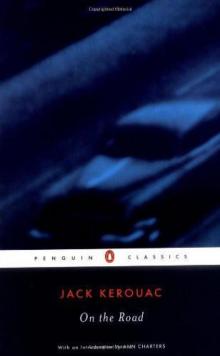 On the Road
On the Road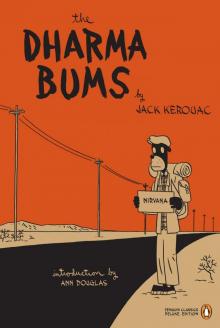 The Dharma Bums
The Dharma Bums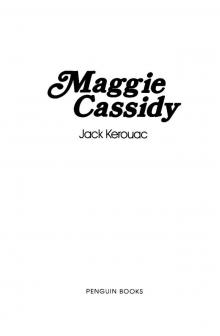 Maggie Cassidy
Maggie Cassidy Big Sur
Big Sur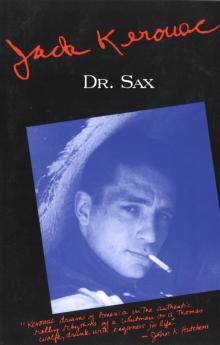 Dr. Sax
Dr. Sax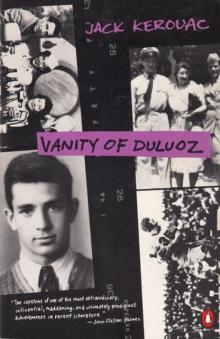 Vanity of Duluoz: An Adventurous Education, 1935-46
Vanity of Duluoz: An Adventurous Education, 1935-46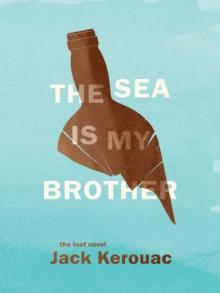 The Sea Is My Brother
The Sea Is My Brother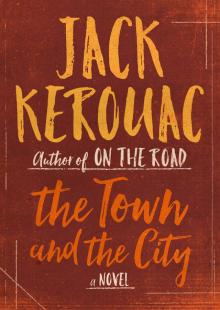 The Town and the City: A Novel
The Town and the City: A Novel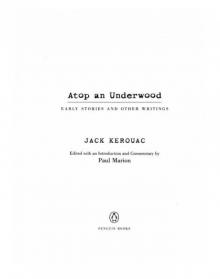 Atop an Underwood: Early Stories and Other Writings
Atop an Underwood: Early Stories and Other Writings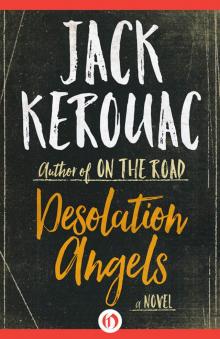 Desolation Angels: A Novel
Desolation Angels: A Novel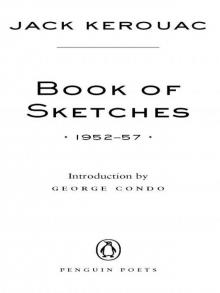 Book of Sketches
Book of Sketches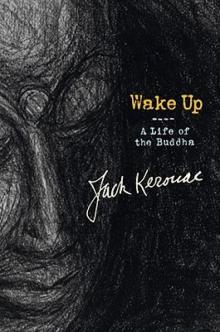 Wake Up: A Life of the Buddha
Wake Up: A Life of the Buddha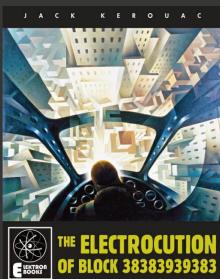 The Electrocution of Block 38383939383
The Electrocution of Block 38383939383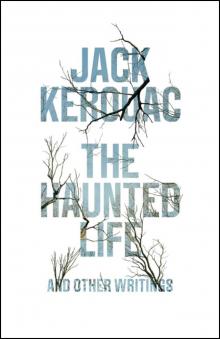 Haunted Life
Haunted Life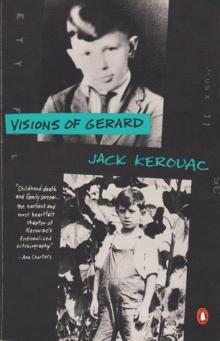 Visions of Gerard
Visions of Gerard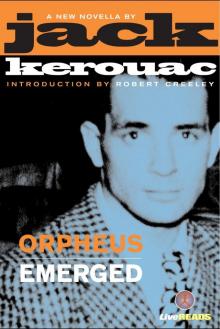 Orpheus Emerged
Orpheus Emerged Book of Blues
Book of Blues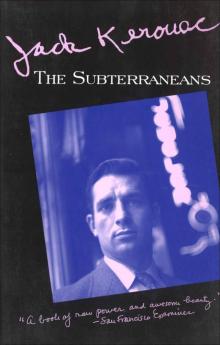 The Subterraneans
The Subterraneans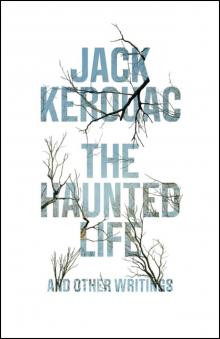 The Haunted Life
The Haunted Life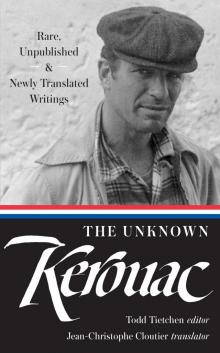 The Unknown Kerouac
The Unknown Kerouac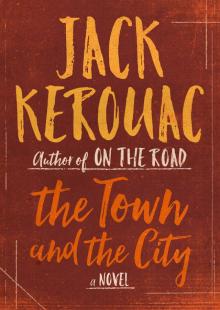 The Town and the City
The Town and the City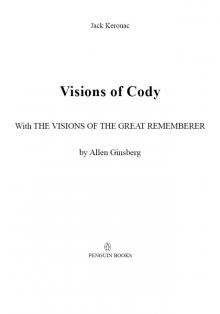 Visions of Cody
Visions of Cody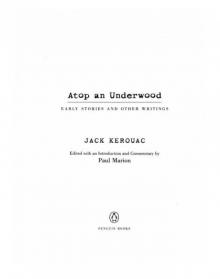 Atop an Underwood
Atop an Underwood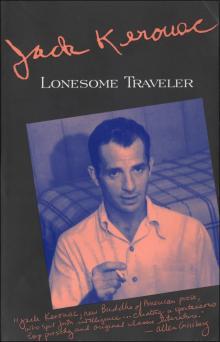 Lonesome Traveler
Lonesome Traveler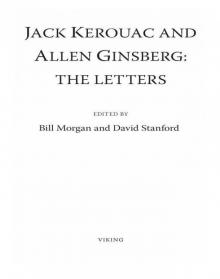 Jack Kerouac and Allen Ginsberg
Jack Kerouac and Allen Ginsberg Vanity of Duluoz
Vanity of Duluoz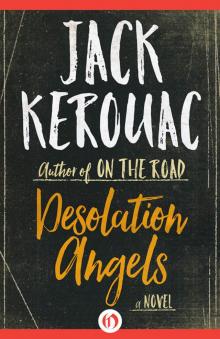 Desolation Angels
Desolation Angels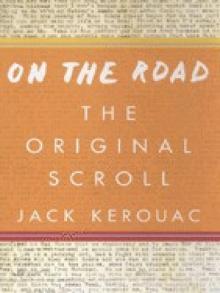 On the Road: The Original Scroll: (Penguin Classics Deluxe Edition)
On the Road: The Original Scroll: (Penguin Classics Deluxe Edition)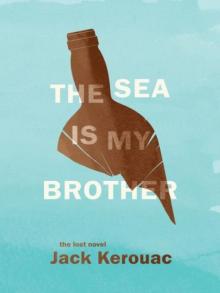 The Sea Is My Brother: The Lost Novel
The Sea Is My Brother: The Lost Novel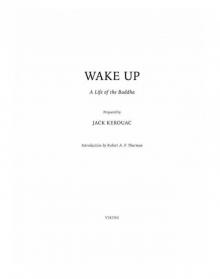 Wake Up
Wake Up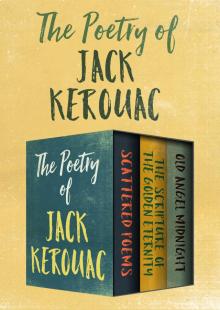 The Poetry of Jack Kerouac
The Poetry of Jack Kerouac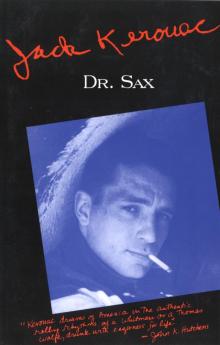 Doctor Sax
Doctor Sax